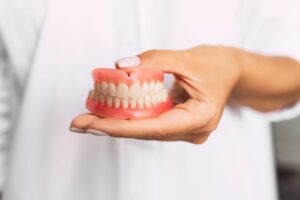Relearning the Basics: 4 Tips for Eating with Dentures
April 2, 2024
Dentures are a tried-and-true way to rebuild your smile after tooth loss that remains popular today. Not only do they boost your confidence by enhancing your appearance, but they also restore your quality of daily life by allowing you to speak and eat more like you used to.
If you’re new to dentures, though, you may need to be patient with yourself until your mouth adjusts to wearing them. In many cases, it takes about a month for your tongue and the muscles in your mouth to relearn basic tasks with them in place. If you’re feeling frustrated about the wait, keep reading for 4 helpful tips that can help you learn to eat with your artificial teeth!
Tip #1: Start Softly
Your dentures rely on a firm suction against the ridges in your mouth to remain put. The constant pressure can leave your gums aching and sore until the tissues have grown accustomed it. You should avoid eating anything overly hard during this time because it can exacerbate any discomfort that you’re feeling. Instead, stick with softer foods like mashed potatoes, soups, pudding, yogurt, and scrambled eggs.
Tip #2: Check the Temperature
When eating with dentures, it’s important to be aware of how hot or cold foods are before you consume them so you don’t accidentally burn or hurt your mouth. This is because your restoration has a somewhat insulating effect that leaves you less able to accurately feel or judge temperature. You can look for visual cues, like steam, but may find it more helpful to gently touch things to your lips before inserting them into your mouth.
Tip #3: Chew Carefully
Once you’re feeling less sore, you can graduate to eating more solid foods, although this can take some practice. Before you experienced tooth loss, there’s a good chance that you tended to chew your food on one side more frequently than the other. If you do this with your artificial teeth, you may find that they start wiggling or slip out of place. You’ll need to begin by chewing slowly and evenly on both sides of your mouth to prevent this from becoming a regular occurrence. It can also help to cut your food into smaller, more manageable pieces.
Tip #4: Watch What You Eat
In time, you’ll become so accustomed to eating with your restoration that you might forget it’s in your mouth. You’ll be able to enjoy most of your favorite foods without issues which can lead you into a false sense of complacency if you’re not careful. Even once you’re comfortable biting and chewing with your dentures, there are some foods you should continue to avoid that can damage them. For example, steer clear of anything overly hard, sticky, or sugary that can harm the materials they’re made from.
Remember to be patient with yourself if you feel challenged while learning this skill. It doesn’t come naturally and may take a bit of time, but it’ll be worth it when you’re once again able to enjoy meals with family and friends!
About the Author
Dr. Byron Reintjes has nearly 30 years of experience offering a full range of top-quality services to people of all ages. He attended Brigham Young University for his undergraduate education and then achieved his doctorate at the Case Western Reserve University School of Dentistry. He strives to treat everyone with compassion and respect and takes the time to get to know you and your unique dental needs. Then, he uses state-of-the-art technology to quickly identify areas of concern and create fully individualized treatment plans to address them. If you need dentures or are worried that yours no longer fit correctly, he’s an expert who can help. You’re welcome to request an appointment on the website or by calling (559) 438-6684.
No Comments
No comments yet.
RSS feed for comments on this post.
Sorry, the comment form is closed at this time.


